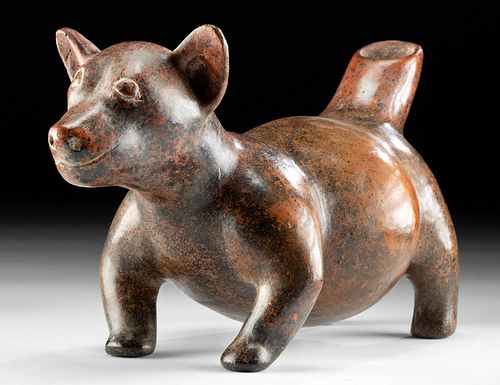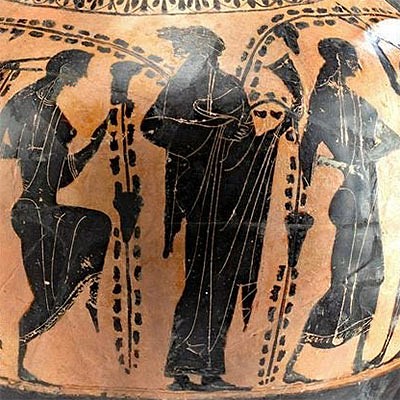Adorable Colima Redware Dog Vessel
Lot 200b
About Seller
Artemis Fine Arts
686 S Taylor Ave, Ste 106
Louisville, CO 80027
United States
Selling antiquities, ancient and ethnographic art online since 1993, Artemis Gallery specializes in Classical Antiquities (Egyptian, Greek, Roman, Near Eastern), Asian, Pre-Columbian, African / Tribal / Oceanographic art. Our extensive inventory includes pottery, stone, metal, wood, glass and textil...Read more
Categories
Estimate:
$2,000 - $3,000
Absentee vs Live bid
Two ways to bid:
- Leave a max absentee bid and the platform will bid on your behalf up to your maximum bid during the live auction.
- Bid live during the auction and your bids will be submitted real-time to the auctioneer.
Bid Increments
| Price | Bid Increment |
|---|---|
| $0 | $25 |
| $300 | $50 |
| $1,000 | $100 |
| $2,000 | $250 |
| $5,000 | $500 |
| $10,000 | $1,000 |
| $20,000 | $2,500 |
| $50,000 | $5,000 |
| $100,000 | $10,000 |
| $200,000 | $20,000 |
About Auction
By Artemis Fine Arts
Jun 10, 2021
Set Reminder
2021-06-10 10:00:00
2021-06-10 10:00:00
America/New_York
Bidsquare
Bidsquare : Exceptional Antiquities | Asian | Ethnographic
https://www.bidsquare.com/auctions/artemis-gallery/exceptional-antiquities-asian-ethnographic-7012
Museum-worthy examples of Egyptian, Greek, Roman, Viking, Near Eastern, Far East / Asian, Pre-Columbian, African / Tribal, Oceanic, Native American, Spanish Colonial, Russian, Fossils, Ancient Jewelry, Fine Art, so much more! Artemis Fine Arts info@artemisfinearts.com
Museum-worthy examples of Egyptian, Greek, Roman, Viking, Near Eastern, Far East / Asian, Pre-Columbian, African / Tribal, Oceanic, Native American, Spanish Colonial, Russian, Fossils, Ancient Jewelry, Fine Art, so much more! Artemis Fine Arts info@artemisfinearts.com
- Lot Description
Pre-Columbian, West Mexico, Colima, ca. 300 BCE to 300 CE. A beautifully constructed, hand-built redware dog vessel of a charming form that exhibits a playful nature and smooth, highly burnished surfaces. The corpulent canine stands with a portly abdomen atop a quartet of bowed legs and features a raised neck, powerful shoulders, and a perky tail that doubles as the vessel's spout. The conical head protrudes out from the neck and bears incised, almond-shaped eyes, a tapered snout with carved-out nostrils, an incised mouth curled into a slight smirk, and a large pair of perky ears flanking the rounded skull cap. Size: 12.375" L x 5.7" W x 6.8" H (31.4 cm x 14.5 cm x 17.3 cm)
Scholars know of at least two types of Colima dogs, one to be fattened up and ritually sacrificed or eaten and one to serve as a watchdog and healer of the ill. This plump hairless canine known as a Chichi or Escuintla is thought to be related to the Chihuahua or Mexican Hairless also known as the Xoloitzcuintle. The Xolo dog was named for the deity Xolotl, the God of the Underworld, and believed to guide the deceased as they journeyed to the afterlife. Colima vessels such as this one were buried in shaft tombs to protect the deceased and provide sustenance for eternity.
Provenance: ex-Stein collection, Bloomfield Hills, Michigan, USA, acquired prior to 2010
All items legal to buy/sell under U.S. Statute covering cultural patrimony Code 2600, CHAPTER 14, and are guaranteed to be as described or your money back.
A Certificate of Authenticity will accompany all winning bids.
We ship worldwide and handle all shipping in-house for your convenience.
#164093Repaired from several large pieces with restoration along areas of body and tail, and resurfacing with overpainting along new material and break lines. Abrasions to tail, body, and head, with softening to some incised features, and light fading to original pigment. Great manganese deposits throughout.Condition
- Shipping Info
-
All shipping is handled in-house for your convenience. Your invoice from Artemis Gallery will include shipping calculation instructions. If in doubt, please inquire BEFORE bidding for estimated shipping costs for individual items.
-
- Buyer's Premium



 EUR
EUR CAD
CAD AUD
AUD GBP
GBP MXN
MXN HKD
HKD CNY
CNY MYR
MYR SEK
SEK SGD
SGD CHF
CHF THB
THB















